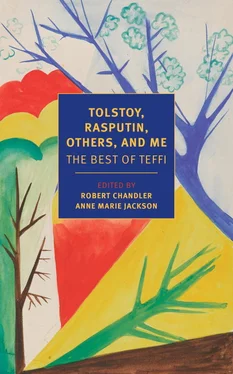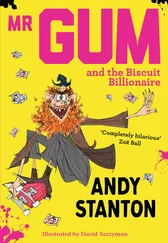MIKHAIL KUZMIN (1872–1936): one of the finest poets of his time. He also wrote plays and composed music. In 1906 he published Wings , the first Russian novel with an overtly homosexual theme; two large editions sold out at once.
NIKOLAI LEIKIN (1841–1906): editor of Oskolki ( Splinters ), the comic journal in which Chekhov published his first stories.
L.A. LINYOV (1853–1920): worked on the Stock Exchange Gazette between 1893 and 1896.
MAXIM LITVINOV (1876–1951): an Old Bolshevik, i.e. a member of the Bolshevik Party from before 1917. Soviet ambassador to the USA from 1941 to 1943.
MIRRA LOKHVITSKAYA (1869–1905): Teffi’s older sister Maria, greatly admired during her lifetime for her often boldly erotic poetry. Teffi wrote surprisingly seldom about Mirra; it is possible that she always felt in some way overshadowed by her.
ANATOLY LUNACHARSKY (1875–1933): a leading Bolshevik; after the Revolution, the first People’s Commissar for Culture and Education.
MARTYN MANDELSTAM (1872–1947): a journalist; later a Soviet functionary.
DMITRY MEREZHKOVSKY (1865–1941): a Symbolist poet and novelist, married to Zinaida Gippius. He was nominated nine times for the Nobel Prize for Literature.
NIKOLAI MINSKY (1855–1937): a minor poet, close to Merezhkovsky and Gippius.
VLADIMIR NEMIROVICH-DANCHENKO (1858–1943): a theatre critic, playwright and director; co-founder, with Konstantin Stanislavsky, of the Moscow Art Theatre.
NATALYA NORDMAN-SEVEROVA (1863–1914): a writer; Ilya Repin’s second wife.
JÓZEF KLEMENS PIŁSUDSKI (1867–1935): a Polish statesman, the person most responsible for the creation of the Second Republic of Poland in 1918. He was Chief of State from 1918 to 1922, and the republic’s de facto leader for the rest of his life.
GEORGY PLEKHANOV (1856–1918): a Russian revolutionary and one of the first Russian Marxists.
STANISLAV PROPPER ( c. 1853–1931): an Austrian immigrant, he acquired the Stock Exchange Gazette in 1880. After the Bolshevik Revolution, he emigrated to Germany.
ALEXEI REMIZOV (1877–1957): a Symbolist, almost surrealist, writer whose work drew on Russian folklore and old Russian literature. He emigrated to Berlin in 1921, and to Paris in 1923.
ILYA REPIN (1844–1930): probably the greatest of all Russian realist painters.
VASILY ROZANOV (1856–1919): a highly controversial writer and philosopher. His best work is deeply personal, much of it an attempt to reconcile Christian teachings with an assertion of the importance of sexuality and family life. His emphasis on the phallus has led to his being referred to as “the Rasputin of the Russian intelligentsia” (Klaus von Beyme, Politische Theorien im Zeitalter der Ideologien , Wiesbaden 2002, pp. 604–05). Himself a somewhat Dostoevskian figure, he married Polina Suslova, a woman twice his age who had once been Dostoevsky’s mistress. In 1919 he died of starvation.
PYOTR RUMYANTSEV (1859–1929): a colleague of Lenin’s in 1905, he abandoned politics two years later.
SKITALETS, “the Wanderer” (1869–1941): the son of a former serf, he was a poet and writer, and a disciple of Gorky, whom he first met in 1897.
DIOMID TOPURIDZE (1871–1942), also known by his pseudonym Karsky: a Georgian Menshevik.
VERGEZHSKY, pseudonym of Ariadna Tyrkova-Williams (1869– 1962): a Russian journalist, founder member of the Constitutional Democrat ( Kadet ) party and a campaigner for women’s rights.
LUDMILA VILKINA-MINSKAYA (1873–1920): a poet, Minsky’s second wife.
MARKO VOVCHOK (1833–1907): pseudonym of Maria Vilinska, who wrote in both Ukrainian and Russian. Her acclaimed volume of Ukrainian folk tales was translated into Russian by Ivan Turgenev.
ANNA VYRUBOVA (1884–1964): a close friend of the Tsaritsa and an intermediary between Rasputin and the royal family. She was also a childhood friend of Prince Felix Yusupov, who played a major role in the plot to murder Rasputin.
BORIS VYSHESLAVTSEV (1877–1954): a Russian philosopher and religious thinker.
PRINCE FELIX YUSUPOV (1887–1967): married the niece of the last tsar. He was one of the three participants in the murder of Rasputin, on 30th December 1916, in the Yusupov Palace.
THE ZAITSEVS: the family of the writer Boris Zaitsev (1881–1972), who emigrated from Russia to Paris in 1922. Teffi was, for many years, close to the whole family and was particularly fond of Natasha, the young daughter who is the central character of “The White Flower”. In a letter to Boris Zaitsev from around September 1925 Teffi wrote: “As for my tenderness toward you, never doubt it, because it’s organic. Not only spiritual, but bodily. We are of the same tribe… Our blood, the smell of our skin, its color, our soft hair, everything is of the same sort—our own” (Edith Haber, forthcoming biography of Teffi, chapter 7). In the Russian text of “The White Flower” Teffi refers to the Zaitsevs merely by their initial: “Z”.
VLADIMIR ZLOBIN (1894–1967): the Merezhkovskys’ secretary and closest friend. He left Russia together with them in 1919 and he shared an apartment with them in Paris. After their deaths he took care of their archive and wrote a memoir, Difficult Soul ( Tyazhelaya Dusha ), about Zinaida Gippius.
I. RUSSIAN TEXTS:
“How I Live and Work” was published in the illustrated magazine Illyustrirovannaya Rossiya (Paris), 27th February 1926; never republished since.
“My Pseudonym” was first published in the newspaper Vozrozhdenie (Paris), 20th December 1931. Republished in Moya Letopis’.
“My First Visit to an Editorial Office” was first published in the journal Segodnya (Riga), 29th September 1929; included in the collection of memoirs Moya Letopis’ (Moscow: Vagrius, 2004).
“Liza” was first published in the short story collection Gorodok , (Paris, 1927); reprinted in Izbrannye proizvedeniya (Moscow: Lakom, 1999), vol. 3.
“Love” was first published in Illyustrirovannaya Rossiya , 15th November 1924, then in Gorodok ; reprinted in Izbrannye proizvedeniya , vol. 3.
“The Green Devil” was first published in Segodnya (Riga), 25th December 1925, then in Gorodok ; reprinted in Izbrannye proizvedeniya , vol. 3.
“Valya” was first published in Vozrozhdenie (Paris), 7th January 1926, then in Gorodok ; reprinted in Izbrannye proizvedeniya , vol. 3.
“Staging Posts” was first published in Poslednie novosti (Paris), 28th April 1940, then in Zemnaya Raduga (New York: Chekhov Publishing House, 1952); reprinted in Izbrannye proizvedeniya , vol. 3.
“The White Flower” was first published in Zveno (Paris), 3rd March 1924, then in Gorodok ; reprinted in Izbrannye proizvedeniya , vol. 3.
“ New Life ”: The first part, up to “And so I began waiting for Lenin”, was published in the newspaper Novoe russkoe slovo (New York), 25th June 1950, under the title “45 Years”. The entire article was later republished in Vozrozhdenie (Paris), January and February 1956, nos. 49 and 50. Teffi almost certainly intended this as a single article, titled “ New Life ”, though recent Russian editions, including Moya Letopis’ , still publish it as two separate articles: “45 Years” and “ New Life ”. Reprinted in Moya Letopis’ .
“Rasputin” was first published in Segodnya on 10th, 13th and 14th August 1924, then in Vospominaniya (Paris, 1932); reprinted in Moya Letopis’ .
Читать дальше












